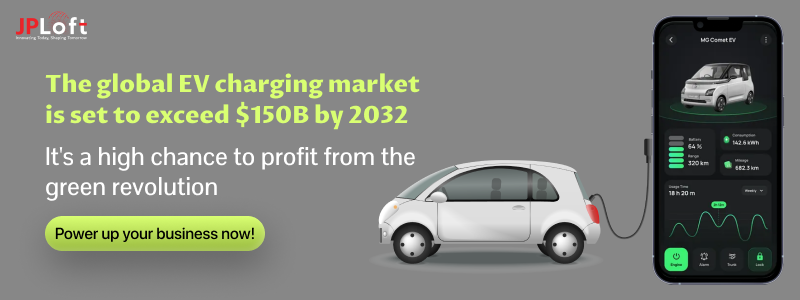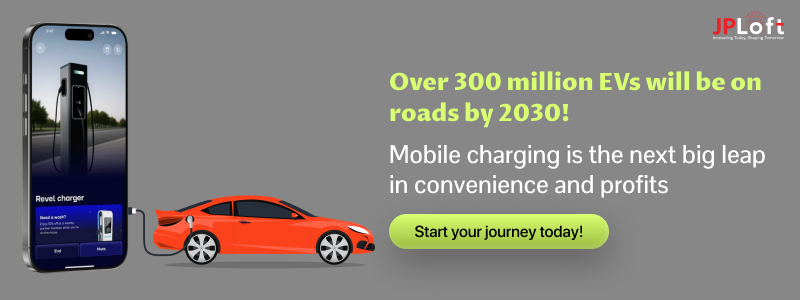"The future is electric, and the future is now." – Elon Musk.
If you’ve been watching the rise of electric vehicles (EVs), you know we’re in the middle of a transportation revolution. The global EV market is projected to reach $1.1 trillion by 2030, and with over 300 million EVs expected on the roads by the same year.
The demand for convenient charging solutions is skyrocketing. That’s where the idea to start an online EV charging business comes in, an innovative approach that combines flexibility, sustainability, and profitability.
In this EV charging startup guide, we’ll walk you through everything from creating an electric vehicle charging business plan to understanding the equipment, licenses, and strategies needed to thrive in this space.
Key Takeaways:
Mobile EV charging meets rising demand by offering flexible, scalable solutions without heavy infrastructure.
A solid business plan and regulatory compliance are essential for smooth operations.
Technology: apps, fleet tracking, and secure payments are the backbone of the service.
Startup costs range from $80K–$300K+, but starting small and scaling reduces risk.
Monetization models like pay-per-charge, subscriptions, and partnerships ensure steady revenue.
Partnering with JPLoft ensures access to expert EV app development, scalable solutions, and future-ready technology.
Understanding the Mobile EV Charging Business
A mobile EV charging business is all about delivering power where it’s needed most.
Instead of relying solely on fixed charging stations, you operate a fleet of vehicles equipped with portable charging units that can reach drivers anywhere, from city streets and office parking lots to remote locations during emergencies.
The real magic lies in combining hardware with technology. Many successful operators integrate electric vehicle software development into their services, creating mobile apps and smart systems that allow customers to book a charger, track arrival times, and pay seamlessly.
This not only improves user convenience but also streamlines fleet management and route optimization for the business owner.
In essence, a mobile EV charging service fills a critical infrastructure gap while offering a scalable, flexible, and eco-friendly business model, one that’s perfectly aligned with the future of transportation.
Market Insights & Opportunities for Mobile Charging Businesses
The electric mobility landscape is undergoing rapid transformation, creating exciting opportunities for mobile charging ventures.
Understanding market dynamics across different regions can help entrepreneurs position their business strategically.
Here are some compelling statistics showing the current state and potential of the mobile EV charging market:
-
According to TIME, in Norway, EVs accounted for a staggering over 80% of new car sales, underscoring a high demand for all forms of charging infrastructure.
-
As per research by Data Intelo, Asia-Pacific is forecasted to record the highest growth rate, with a CAGR of 30.2% by 2033, led by enthusiastic EV adoption in China, Japan, and South Korea.
-
A report given by Verified Market Research shows that by 2033, the global mobile EV charger market is projected to grow to $6.8 billion from $1.5 billion in 2026, signaling strong investor confidence and market expansion.
-
Data Intelo also suggests that North America held approximately 35% of the global mobile EV charger market in 2023, with the U.S. leading the demand surge due to supportive policies and expanding EV adoption.
The growing shift to renewables, especially in countries like Norway, offers a unique entry point with sustainability as a core value.
As EV ownership continues to climb globally, mobile charging services are poised to fill critical gaps, particularly in urban areas and underserved regions.
Why Start a Mobile EV Charging Business?
If you’re wondering whether now is the right time to start an electric vehicle charging business, here are some compelling reasons to jump in:
-
Booming EV Market: With millions of EVs expected on the roads in the next decade, mobile charging services offer a lucrative opportunity to meet growing demand without heavy infrastructure costs.
-
Flexible Business Model: Unlike fixed stations, mobile units can serve multiple locations, events, and emergencies, giving you more reach and adaptability.
-
Low Entry Barriers with Smart Planning – Start an online Electric Vehicle charging business plan helps you start small and scale quickly as demand grows.
-
Franchise Potential: Many companies now offer EV charging franchise opportunities, allowing you to tap into a proven business model with brand recognition and operational support.
-
Technology-Driven Advantage: Incorporating unique EV app ideas and smart booking systems can make your business stand out while improving customer experience.
-
Sustainability & Public Support: With governments pushing green initiatives and eco-conscious consumers on the rise, your mobile charging service will align perfectly with environmental goals.
How to start an on-demand EV charging service now means getting ahead of the curve in a market that’s only going to accelerate. With the right plan, technology, and execution, your mobile Electric Vehicle charging business can be both profitable and future-proof.
Regulations & Licensing Requirements for Mobile EV Charging
Before you start a mobile EV charging business, it’s crucial to understand the legal framework that governs your operations. Compliance not only protects you from fines but also builds trust with customers and partners.
A] Business Registration & Licensing
-
Register your company under the appropriate business category in your region.
-
If you plan to start an electric vehicle charging business as a franchise, follow the brand’s licensing guidelines and meet state or national requirements for EV charging franchise opportunities.
B] Energy & Utility Permissions
-
Obtain clearances from local electricity boards or energy departments.
-
Include these permissions in your electric vehicle business plan to avoid delays in launching an EV charging business online.
C] Environmental & Safety Compliance
-
Adhere to environmental standards related to emissions, battery disposal, and noise levels.
-
Ensure your mobile charging units are certified for safety and meet EV equipment regulations.
D] Technology & Data Regulations
-
If you want to build an EV charging station finder app, integrate amazing app ideas for booking and payments, comply with data privacy laws (e.g., GDPR or local equivalents).
-
Secure payment gateways and user data encryption to protect customer information.
E] Vehicle & Road Permits
-
Acquire permits for operating commercial vehicles equipped as mobile EV charging stations.
-
Follow weight, size, and fuel (if applicable) guidelines for your fleet.
By covering these regulatory checkpoints early, you’ll make your business legally compliant and ready for smooth operations.
Technology & Infrastructure Needs for a Mobile EV Charging Setup
When you start an online EV charging business, having the right technology and infrastructure is crucial for smooth operations and customer satisfaction.
Here’s a simple breakdown of what you’ll need:
|
Requirement |
Description |
Business Benefit |
|
Mobile Charging Vehicles |
Vans or trucks equipped with portable chargers that can reach customers anywhere. |
Enables a flexible on-demand EV charging service. |
|
Charging Equipment |
High-capacity chargers compatible with different EV models. |
Ensures reliable EV charging solutions. |
|
Software & Apps |
Mobile apps for booking, tracking, and payment integration. |
Improves efficiency and customer convenience. |
|
Payment & Billing System |
Secure digital payment gateways and invoicing tools. |
Smooth operations and better ROI for EV charging business investment. |
|
Fleet Management Tools |
GPS, route optimization, and maintenance tracking systems. |
Helps efficiently run your mobile EV charging station. |
|
Backup Power & Batteries |
Portable battery packs or generators for uninterrupted service. |
Ensures reliability and uptime for all customers. |
With these components in place, you can offer fast, reliable, and convenient services to EV owners while making your business scalable and profitable.
Proper investment and setup of the Electric vehicle charging business in technology and infrastructure will set your mobile EV charging venture apart in a growing market.
Step-by-Step Guide: How to Start a Mobile EV Charging Business
The future is electric, and the rising number of electric vehicles (EVs) on the roads presents a golden opportunity for entrepreneurs.
If you’re wondering how to start an on-demand EV charging service, this step-by-step guide will take you through everything, from planning and licensing to technology, marketing, and scaling your operations.
By following these steps to launch a mobile EV charging business, you can tap into a thriving market and build a sustainable, profitable business.
Step 1: Understand the Electric Vehicle Market
Before you launch an EV charging business online, it’s essential to research the electric vehicle charging market.
Globally, the EV market is growing at an exponential rate, with millions of vehicles being added every year, driving the demand for convenient and accessible charging solutions.
A thorough understanding of market trends, customer pain points, and emerging technologies will help shape your EV charging business ideas and give you a competitive edge.
Governments worldwide are supporting EV. So, if you start an online Electric Vehicle charging business infrastructure growth, offering incentives for charging solutions, which makes this an opportune time to enter the market.
Step 2: Draft a Solid Electric Vehicle Charging Business Plan
A clear electric vehicle charging business plan is the foundation of success. This plan should define your goals, outline investment requirements, establish revenue models, app tech stack and describe operational and marketing strategies.
You need to allocate budgets for vehicles, portable EV charging station equipment, and technology. Pricing strategies should cover services like mobile EV charger service and subscription models to ensure a sustainable revenue stream.
If you plan to expand rapidly, consider EV charging franchise opportunities. Your plan should also include a timeline for business launch, growth milestones, and scaling strategies.
Step 3: Choose the Right Mobile EV Charging Model
When you start an electric vehicle charging business, selecting the right operational model is key. You can opt for an on-demand EV charging service, deploying mobile units directly to customer locations to address the common “range anxiety” problem.
Alternatively, you could offer portable EV charging station rentals, setting up temporary charging units at events, parking lots, or commercial areas.
Another option is to join a franchise or partnership model through existing EV charging franchise opportunities, which provides brand recognition and faster market penetration.
Step 4: Obtain Licenses and Compliances
Legal compliance is non-negotiable when running a mobile EV charging station. You will need to complete business registration and acquire trade licenses to operate legally.
Permissions from local energy boards or utility authorities are also necessary to ensure your services are officially sanctioned.
Additionally, compliance with environmental and safety standards is critical, covering everything from battery disposal to equipment safety certifications.
Step 5: Acquire the Right Equipment and Vehicles
A successful mobile Electric Vehicle charging business depends on having the right hardware. Invest in mobile EV charging vehicles, such as vans or trucks fitted with portable chargers that can reach customers wherever they are.
You’ll also need high-capacity portable EV charging station equipment compatible with multiple EV models to serve a wide range of vehicles efficiently.
Backup power sources, such as batteries or generators, are essential to provide uninterrupted service in emergencies or areas with limited grid access.
Choosing reliable, high-quality equipment forms the backbone of your EV charging solutions and ensures a professional, dependable service for your customers.
Step 6: Integrate Technology and Mobile Apps
Technology is the key differentiator in a mobile EV charging business.
Modern operations rely heavily on apps and software for booking, payment, fleet tracking, and customer support.
Electric vehicle software allows you to create custom apps for real-time booking, route planning, and seamless payments, while features of EV apps like charging status updates, GPS tracking, digital invoices, subscription management, and push notifications enhance the user experience.
Additionally, online dashboards for fleet management and maintenance alerts help streamline operations. A robust digital platform ensures that customers enjoy a smooth, hassle-free experience, making your on-demand EV charging service highly attractive.
Step 7: Hire and Train a Skilled Team
Even with the best technology and vehicles, a skilled team is crucial. Your team should include technicians for charger installation and maintenance, drivers to operate the mobile units, and customer support staff to handle app queries and bookings.
Additionally, if you are developing a custom mobile app or software platform for your mobile EV charging station, it’s important to hire dedicated developers to ensure smooth functionality, advanced features, and seamless user experience.
Training the entire team should focus on technical proficiency, safety protocols, and delivering excellent customer service, which will help differentiate your business from competitors.
Step 8: Market Your Mobile EV Charging Business
Effective marketing can make or break your startup. Start with digital marketing using SEO, social media, Google Ads, and local listings to reach EV owners directly.
Build partnerships with EV dealerships, parking lots, and commercial fleets to expand your reach and credibility.
Implement referral programs by offering discounts to customers who bring in new users, and consider providing services at events by deploying portable EV charging stations at large gatherings or corporate functions to boost brand visibility.
Additionally, start an online EV charging business startup in promotional materials reinforces your expertise and positions your business as a reliable, professional service provider.
Step 9: Monitor Financials and ROI
To ensure your EV charging business investment is worthwhile, track revenue from different services such as mobile EV charger service, subscriptions, and emergency charging.
At the same time, calculate operating expenses, including vehicle maintenance, electricity costs, and staff salaries. Use this data to adjust pricing or operational strategies based on demand and market feedback.
This is one of the important steps to launch a mobile EV charging business for clear understanding of your finances will help ensure long-term sustainability and steady growth.
Step 10: Plan for Expansion and Franchising
Once your initial setup electric vehicle charging business proves successful, consider scaling by opening additional mobile EV charging stations in nearby cities or high-demand areas.
Exploring EV charging franchise opportunities can help you expand faster, while continuously innovating with new EV charging solutions ensures you stay ahead of the competition.
With the right strategy, expansion plan, and partnering with the best mobile app development company, your business can become a major player in the electric vehicle infrastructure growth trend.
From crafting a solid business plan to investing in the right vehicles, chargers, and apps, every step contributes to building a reliable, scalable, and profitable service.
All the steps to launch a mobile EV charging business can help you to tap into the growing demand for sustainable transportation and position your business for long-term success.
Cost Breakdown for Starting a Mobile EV Charging Business
Starting a mobile EV charging business is an exciting opportunity, but it requires a significant investment to set up vehicles, equipment, technology, and operational systems.
On average, entrepreneurs can expect to spend between $80,000 and $300,000+ depending on the scale, number of vehicles, and service coverage. A large portion of the budget typically goes into mobile EV charging stations, high-capacity chargers, and fleet vehicles.
Additionally, investing in digital infrastructure is critical, and the cost to build an EV software for booking, payments, fleet tracking, and customer support must also be factored in. Understanding these costs upfront helps you plan a realistic budget and ensures smooth operations from day one.
Below is the detail cost breakdown:
|
Expense Category |
Estimated Cost ($) |
Description |
|
Mobile EV Charging Vehicles |
40,000 – 150,000 |
Vans or trucks equipped with portable chargers. |
|
Portable EV Charging Equipment |
20,000 – 70,000 |
High-capacity chargers compatible with various EV models. |
|
Software & App Development |
10,000 – 50,000 |
Custom apps, booking systems, and fleet management dashboards. |
|
Backup Power & Batteries |
5,000 – 20,000 |
Generators or portable battery packs for uninterrupted service. |
|
Licenses & Legal Fees |
2,000 – 10,000 |
Business registration, permits, and compliance costs. |
|
Marketing & Promotions |
3,000 – 10,000 |
Digital marketing, partnerships, and event promotions. |
|
Staff Hiring & Training |
5,000 – 20,000 |
Technicians, drivers, and customer support training. |
Investing in quality equipment, technology, and skilled personnel is crucial for ensuring the reliability and growth of your mobile EV charging venture.
Proper budgeting also allows for scaling the business efficiently and adapting to increasing demand.
With careful planning and investment, you can start a mobile EV charging business that can become a profitable and sustainable venture in the rapidly growing EV market.
Challenges to Start a Mobile EV Charging business & How to Overcome Them
Starting a mobile EV charging business comes with its share of hurdles. Understanding the biggest EV challenges and addressing them proactively can help you succeed:
1. High Initial Investment
-
Challenge: Setting up vehicles, portable chargers, and apps requires substantial capital.
-
Solution: Start small with a few mobile units, explore EV charging franchise opportunities, and gradually scale. Secure investors or loans to manage business investment efficiently.
2. Technology Integration
-
Challenge: Implementing apps for booking, payments, fleet tracking, and real-time updates can be complex.
-
Solution: Hire mobile app developers and leverage AI for intelligent and reliable software solutions.
3. Regulatory Compliance
-
Challenge: Navigating licenses, environmental norms, and electricity board permissions can be overwhelming.
-
Solution: Research local laws thoroughly, include compliance in your electric vehicle charging business plan, and consider consulting experts.
4. Range Anxiety & Customer Trust
-
Challenge: Customers may hesitate to rely on mobile chargers due to concerns about availability and reliability.
-
Solution: Offer transparent booking, reliable service, and on-demand EV charging service to build trust and reputation.
5. Competition & Market Awareness
-
Challenge: The growing EV industry is attracting multiple players.
-
Solution: Differentiate your business with unique EV charging solutions, innovative features, and superior customer service.
Addressing these biggest hurdles early on ensures smoother operations, better customer satisfaction, and higher chances of building a profitable mobile EV charging business.
What Are Some Famous Future Trends in Mobile EV Charging Business?
There are several trends that are helping the mobile EV charging business grow rapidly and adapt to evolving customer needs such as smart charging & AI Integration, Partnership & Corporate collaborations, Renewable energy integration & more.
So, below are some key trends that you should watch closely if you want to stay ahead in this competitive industry.
1] Smart Charging & AI Integration
AI-powered systems optimize routes, predict demand, and reduce downtime for on-demand EV charging service. Using AI app development services enhances scheduling and fleet management.
2] Partnerships & Corporate Collaborations
Collaboration with EV manufacturers, commercial fleets, and government programs will open new revenue streams and strengthen market presence.
3] Renewable Energy Integration
Solar-powered and hybrid charging units will reduce operational costs and increase sustainability, aligning the business with eco-friendly goals.
4] Expansion of Portable Charging Solutions
Innovations in portable EV charging station technology will allow faster, more flexible deployment at events, workplaces, and remote areas.
5] Innovations in EV Apps
Mobile apps are becoming increasingly sophisticated, offering real-time tracking, automated payments, subscription models, and fleet management features. Keeping up with EV app development trends ensures a seamless customer experience.
These trends indicate that the future of mobile EV charging is tech-driven, sustainable, and highly customer-focused, offering immense growth opportunities for entrepreneurs.
Monetization Models for EV Charging Business
A well-planned monetization strategy is crucial to ensure your EV charging business is profitable and scalable in the long run.
With the rising adoption of electric vehicles, businesses can explore multiple revenue streams and adapt them to market needs.
Here are some proven monetization models for EV charging app development solutions:
1. Pay-Per-Charge Model
Users pay each time they charge their vehicle, based on the energy consumed (per kWh) or the duration of usage.
This is a straightforward and transparent approach, ideal for public charging stations and on-demand mobile EV charging services.
2. Subscription-Based Model
Customers pay a fixed monthly or yearly fee to access charging services.
This model ensures consistent revenue and builds customer loyalty, especially for frequent EV users or fleet operators.
3. Freemium Charging Model
Offer free basic charging access for a limited period or at slower speeds, while charging for faster charging options, priority booking, or premium locations.
This model works well in competitive markets.
4. Partnership & Revenue-Sharing Model
Collaborate with parking lots, malls, hotels, and corporate offices. Install charging stations at their premises and share the generated revenue.
This expands network reach without heavy infrastructure investment.
5. In-App Advertising & Promotions
If you have your own EV charging mobile app, you can monetize through third-party advertisements, sponsored station listings, and special offers from partner businesses.
By combining these models or customizing them for your target market, your EV charging business can create a steady income stream while delivering value to EV owners.
The right monetization approach will not only recover your investment faster but also position you strongly in this rapidly growing industry.
Case Studies: Successful Mobile EV Charging Startups
To truly understand the potential of this fast-growing sector, it’s worth looking at real-world examples of companies that have successfully tapped into the mobile EV charging market.
These case studies highlight how innovative ideas, strong execution, and the right technology can help you start a mobile EV charging business and achieve long-term growth.
1. SparkCharge (USA)
SparkCharge is a pioneer in the on-demand EV charging space, offering mobile charging units that can be delivered to a driver’s location.
Their flagship product, “The Roadie,” enables charging anywhere without the need for permanent infrastructure.
Through strategic partnerships with roadside assistance providers and delivery fleets, SparkCharge has expanded its market reach and positioned itself as a leader in flexible EV charging solutions.
Key Takeaways:
-
Portable charging technology increases accessibility for EV drivers.
-
Partnership-driven growth ensures a steady client base.
-
Subscription models provide predictable revenue streams.
2. EV Safe Charge (USA)
EV Safe Charge started by offering mobile charging services for events, hotels, and fleet operators. Their service, "ZiGGY," is an autonomous EV charging robot that can navigate parking lots and deliver charging directly to vehicles.
By focusing on both convenience and cutting-edge automation, they have gained attention from major corporate clients and municipalities.
Key Takeaways:
-
Automation and robotics enhance operational efficiency.
-
Targeting commercial clients ensures higher-volume usage.
-
Sustainable energy sourcing improves brand appeal.
3. MoovElectric (UK)
MoovElectric focuses on providing mobile EV charging to urban areas where public charging points are limited. They utilize electric vans equipped with battery packs to deliver charges directly to customers.
By addressing the problem of “charging deserts,” MoovElectric has built a loyal customer base among city-dwelling EV owners.
Key Takeaways:
-
Addressing underserved markets creates niche dominance.
-
Flexible delivery models suit both individual and fleet customers.
-
Real-time booking via mobile apps enhances customer experience.
These case studies prove that with the right strategy, you can start a mobile EV charging business that meets evolving customer needs, leverages advanced technology, and creates a sustainable competitive advantage.
The key lies in identifying the right target audience, choosing scalable technology, and continuously innovating to stay ahead in this rapidly expanding industry.
Why Partner with JPLoft for Mobile EV Charging App Development?
Choosing the right technology partner can make or break your mobile EV charging business. JPLoft, a leading Electric Vehicle software development company, specializes in building robust, scalable, and user-friendly apps tailored for EV charging solutions.
With proven industry expertise, we have years of experience in developing cutting-edge mobility and energy-tech solutions. We create custom EV charging app features, including real-time booking, route tracking, secure payments, and advanced analytics, ensuring your platform meets modern demands.
Our solutions are designed to scale with your business, whether you’re a small startup or managing large EV fleets. By integrating IoT and smart charging capabilities, we enable efficient and automated operations.
With us, you get more than just an app, you gain a strategic technology partner dedicated to making your EV charging business future-ready.
Final Wrap-Up
To successfully start a mobile EV charging business, it’s essential to combine innovative technology with strategic planning and a user-first approach. With the EV market expanding rapidly, this is the right time to invest in a solution that offers convenience, accessibility, and scalability.
By leveraging smart app development, you can create a platform that stands out, meets market demands, and positions your business for long-term growth in the electric mobility sector.
The key is to stay adaptable, embrace evolving trends, and deliver a seamless charging experience that keeps customers coming back. With the right execution, your venture can drive both profitability and sustainability.
FAQs
A mobile EV charging business provides on-demand electric vehicle charging services through portable charging units, eliminating the need for fixed charging stations.
Profitability depends on market demand, operational efficiency, and service pricing. With EV adoption growing, it can be a lucrative venture when managed well.
Common challenges include high setup costs, regulatory compliance, customer trust, technology integration, and market competition.
Start by researching your target market, creating a detailed electric vehicle charging business plan, securing funding, and partnering with a reliable app development company.
Yes. A dedicated app helps customers locate your service, book charging slots, make payments, and track service in real-time.













Share this blog